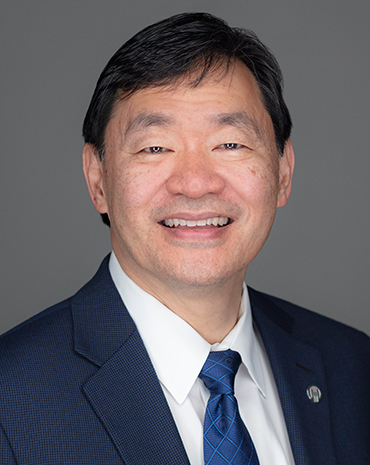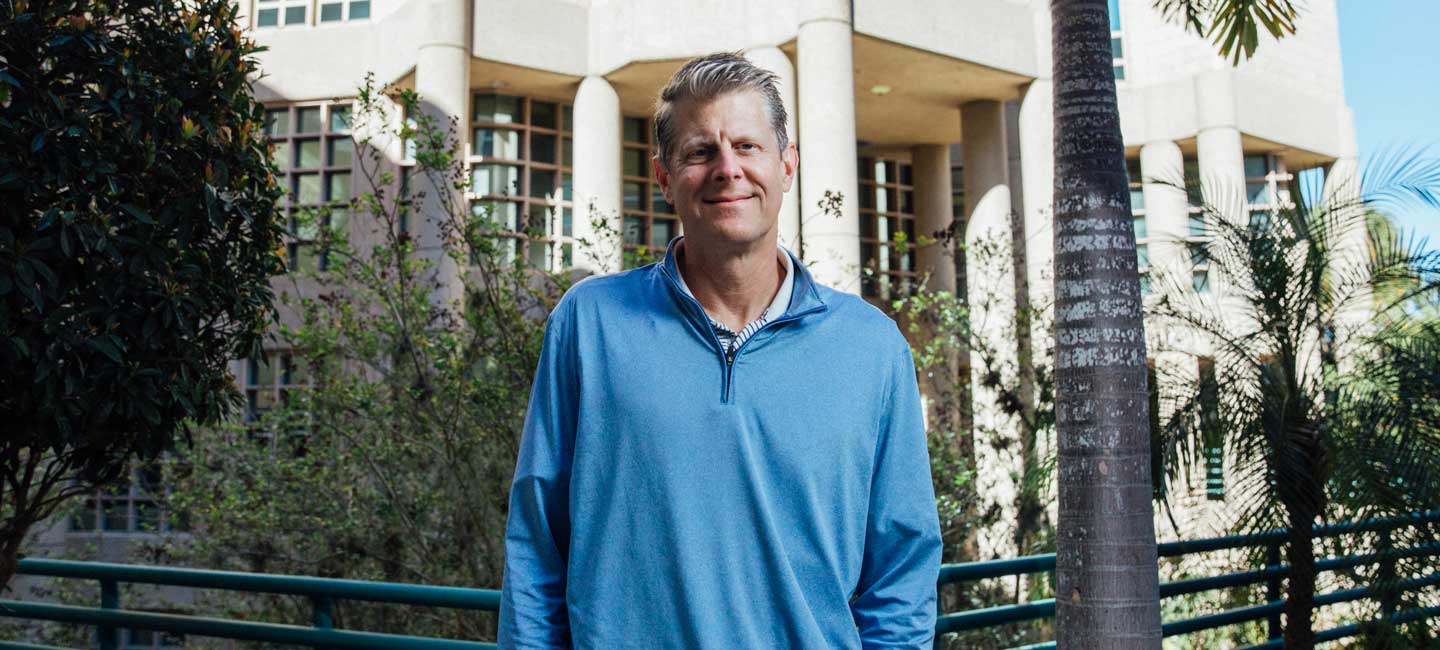Aggressively Facing Advanced Melanoma
Mike Potthoff’s cancer journey began with a diagnosis of acral lentiginous melanoma. “It’s not the type of melanoma caused from sun exposure,” said Potthoff. “This cancer usually shows up in places like your fingernails or bottom of your feet. Bob Marley passed away from this type of melanoma.” The rare form of skin cancer also is found on the palms of hands or under toenails. Acral melanoma the most common type of melanoma among people with darker skin, and it is found more frequently in African Americans and Asians.
Shortly after the diagnosis Potthoff had his thumb, along with some sentinel lymph nodes, removed at Siteman Cancer Center in St. Louis, Missouri, near his home. A few months later the cancer had spread. That was in 2014. The survival rate was grim and there was no standard of care for this type of cancer at the time, and the doctor suggested he look for a clinical trial.
Potthoff knew he had to aggressively search out the best treatment, especially in view of his responsibilities as a husband and the father of four boys, now in college, and vice president of Retail Sales for Anheuser-Busch.
He visited medical oncologists at five different cancer hospitals, ultimately connecting with Patrick Hwu, MD, through the recommendation of a family friend. Soon Potthoff was at MD Anderson Cancer Center under the care of Hwu, renowned medical oncologist and then chair of the Department of Melanoma Medical Oncology.
Potthoff recalls Hwu recommended a clinical trial of checkpoint inhibitors ipilimumab and nivolumab (IPI/NIVO) that was not available at MD Anderson. The combination treatment is now approved by the FDA to treat patients with advanced melanoma, but early on the therapy was available only by participating in a clinical trial.
Prioritizing the Patient
On the spot, Hwu called the principal investigator of the trial and learned the trial was accruing patients in Connecticut and in Tennessee. “Dr. Hwu suggested I select the location that was most convenient, so I went to the Sarah Cannon Cancer Center in Nashville to participate in the IPI/NIVO trial under the care of Dr. Jeff Infante,” said Potthoff. “That’s when I probably gained the most respect for Dr. Hwu in that he prioritized the patient and doing what’s best for the patient over his own practice and hospital.”
Unfortunately, the immunotherapy regimen did not work well for Potthoff, and when cancer returned, he opted to go back to Hwu. “I knew he was the person I wanted to manage my cancer from there,” said Potthoff. He underwent numerous surgeries, and in 2017 Hwu placed him on a new immunotherapy clinical trial of tumor-infiltrating lymphocytes (TIL). Early in his career, Hwu had worked with colleagues at the National Cancer Institute, using immunotherapies and gene therapies to treat patients with advanced cancers. Their work with TIL showed success in melanoma.
TIL is a form of cellular immunotherapy that leverages components of the patient’s own immune system to seek out and attack specific cancer cells. TILs, special T cells, are naturally present inside some tumors. In TIL therapy, TILs are collected from the tumor during a biopsy or surgical resection, then grown to large numbers in a laboratory. Once successfully grown to billions in number, the TILs are infused back into the patient, where they actively attack cancer cells while leaving healthy cells alone.
Equipping T Cells with a Gas Mask
Before he could receive the TIL therapy, Potthoff underwent chemotherapy to in effect remove his immune system to condition it to receive infusions of TIL that would replace his immune system with the aim of irradicating the melanoma. These TIL infusions were followed by doses of interleukin 2 (IL-2).
“They took my T cells out of the tumors they had removed from previous surgeries, genetically modified them to make them resistant to the toxic effects of TGF-beta and multiplied them into the billions,” said Potthoff. TGF-beta is a substance the tumor makes to try to inhibit immune cells. The immune cells cannot come into the tumor, proliferate or survive because of TGF-beta, which is like poison to T cells.

Potthoff was part of an investigator-initiated clinical trial borne out of research in Hwu’s laboratory at MD Anderson Cancer Center. It is the first trial of its kind with TIL cells. The aim is for the trial findings to be published soon, and the hope is that ultimately this treatment will become FDA approved for patients with late-stage melanoma.
“Adding a gene into the T cells so they would resist the toxic effects of TGF-beta in effect puts a gas mask on the TIL so they could survive in the battlefield of the tumor,” said Hwu.
Pottoff was given a transfusion of those genetically modified T cells in October 2017, followed by multiple and consistent infusions of IL-2 over October, November and December. IL-2 supercharges the T cells, and the idea is to get in as many infusions the body will withstand.
Receiving TIL therapy involves cycles of staying in the hospital for three or four weeks, then a week away from the hospital, but the patient must remain near the hospital during any break in therapy. Potthoff secured an apartment nearby where his wife, Patricia, could stay while he was in the hospital and this also allowed him to stay nearby during the off week in case of a reaction.
After he finished the courses of TIL therapy in 2017, Mike continued his follow-up care with Hwu at MD Anderson, and now he sees Hwu at Moffitt Cancer Center every few months for scans and follow-up visits.
Optimism and Reasons to Believe
Asked why he followed Hwu to Tampa for follow-up care, Mike cited Hwu’s experience and expertise in melanoma treatment. Equally important was Hwu’s positive and confident manner. “He treats you as a person and really cares about people and understands what you are going through,” said Mike. “When you sit with him, he gives you a sense of calm. He’s very optimistic and it gives you the reasons to believe.”
The commute for the follow-up care has not presented a challenge because Mike is accustomed to traveling. In his work for Anheuser-Busch, where he has been the past 25 years, he spends about 60% of his time traveling throughout the country as he manages national accounts. And he is no stranger to Tampa, having lived in Fish Hawk for a couple years with his wife and sons – the oldest son, Ryan, plus a set of triplets, Tyler, Dylan and Kyle – while they were in grade school. His job then moved him for the third time to St. Louis, where he was born and raised. In addition, their family has lived on the West Coast on four different occasions.
More recently, Mike and Patricia purchased a second home near the water in the Tampa Bay area to facilitate his stay during follow-up visits with Hwu and to use for family get-togethers. When not traveling or working, Mike enjoys golfing with friends, business acquaintances and his sons who are picking up the sport. More than anything else, he enjoys being with his family as much as possible. “I spend a lot of time with the kids; they are so very busy, so when they are on break from school we spend time together as a group, playing basketball, going for a run, golfing, fishing – most of all, time with family,” said Mike.
He especially looks forward to seeing Ryan graduate in May, “which I never believed I would be around to see,” said Mike. “Also, I’m looking forward to celebrating my parents’ 60th wedding anniversary this summer with family which, again, did not think I would be around to witness, but thanks to Dr. Hwu I will be able to witness both of these family milestones.”


